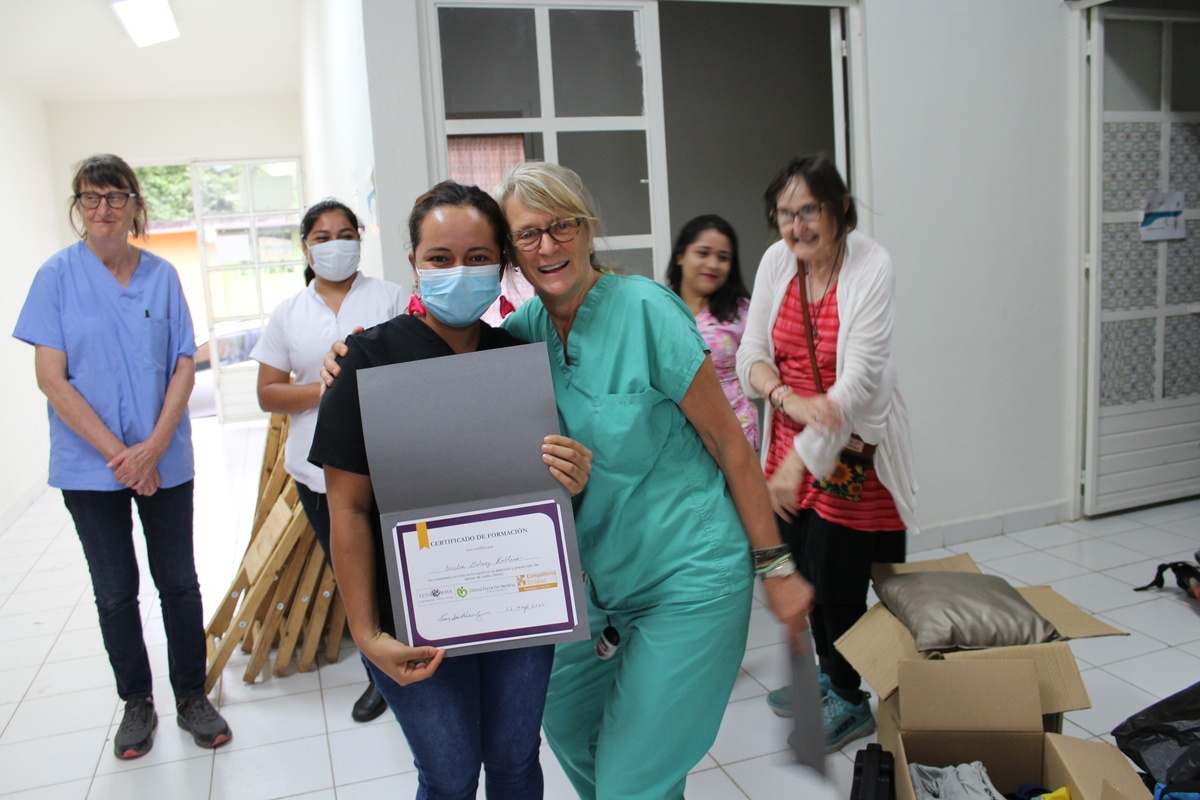Becoming a Nurse: The Education of Cecilia Gálvez
How a young woman from rural Mexico fulfilled her dream
Posted on May 9, 2023

As a child growing up in Salvador Urbina, a small community in the Frailesca region of Chiapas, Mexico, Cecilia Gálvez would walk two hours with her mother to the nearest health center for vaccinations.
During those walks, she would imagine her future. “From that moment on, I grew up with the idea that I wanted to be a nurse," she says.
Over time, Gálvez realized that everyone in her community of 600 people faced similar challenges traveling to town and accessing health care. She pictured herself supporting her community so that they would no longer have to trek for hours elsewhere when they felt sick.
In 2014, the Mexican Ministry of Health built a clinic in Gálvez’s community, and Compañeros En Salud, as Partners In Health is locally known in Mexico, began working in the community as well. Compañeros En Salud has worked in the state of Chiapas since 2011 in partnership with the Ministry of Health.
Gálvez eagerly applied to become a clinic assistant, where she learned to triage patients, make home visits to chronically ill people, classify medications in the pharmacy, and do sutures. At the same time, she worked as an acompañante for a year.
Acompañantes are community health workers from the communities where Compañeros En Salud works. Since 2012, this program has hired and trained people to provide medications and basic health services, such as screenings, and to conduct home visits to patients with chronic illnesses. Compañeros En Salud currently has nearly 100 acompañantes on staff.
As she worked as a clinic assistant and acompañante, Gálvez was beginning to forge her own path. She decided to start nursing school in Tuxtla Gutiérrez, a city about four hours away from home. It wouldn’t be easy. As a woman from an impoverished community, struggling to make ends meet, Gálvez knew that becoming a nurse would involve immense time, effort and resources.
Each weekend was the same slog: every Friday, she had to travel two hours to Jaltenango de la Paz, where she spent the night, and then drive the next morning, before dawn, to Tuxtla Gutiérrez to take classes. On Sundays, she had to travel back to Salvador Urbina to work Monday through Friday at the clinic.
This was not the only challenge she had to confront to achieve her dreams, Gálvez says. Because it is customary for women in her community to stay home and care for the family, the decision to attend nursing school was a break with tradition. But, she says, she didn’t mind if neighbors criticized her for attending school.
“Since I was little, I saw machismo and violence against women, and I wasn't going to continue with that," she says.
Machismo, a form of toxic masculinity, is still present in the Frailesca communities of Chiapas, and Gálvez, like many other women, fight every day to break stereotypes, eliminate gender roles, and bring about gender equity. For Gálvez, nursing school was not only a path out of poverty but also a way to forge her own—in spite of traditional gender roles.
After years of intensive study, Gálvez graduated. She then took her skills where she had once envisioned: working as a community nurse for Compañeros En Salud, in the communities where she was once a patient.
Since 2020, she has taken her career a step further, becoming a clinical supervisor. In this role, she mentors nursing and medical interns doing their year of social service at the rural clinics.
"I have been growing professionally and as a leader by supporting my team," she says.
Currently, the clinics are expanding the role of nursing, which includes developing nurses’ clinical skills and encouraging more decision-making and autonomy among nursing staff.
“Before, we depended a lot on the doctors. They were the ones who made the decisions," Gálvez says. “But now, we are validating nurses and acknowledging that we have the tools to make important decisions and care for patients.”

